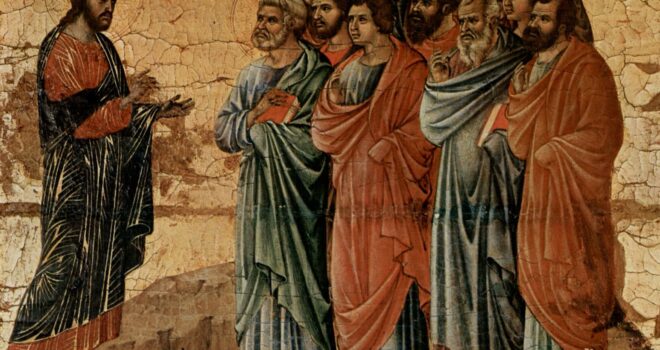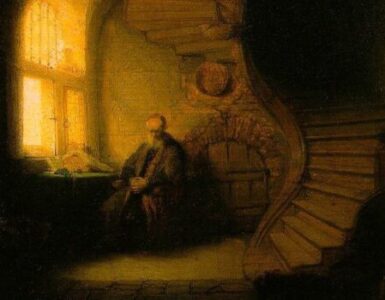Letting Divine Friendship Ignite Our Souls
Who is Jesus to you? Is he a distant historical figure or someone real and alive today? What would your response be if he asked you plainly: “And who do you say that I am?” Do you ever wish you could have a close, intimate conversation with Jesus? Can you imagine Jesus gazing intently into your eyes and asking with utmost seriousness: “And who do you say that I am?” What courageous profession of faith would spring from your heart?
These soul-piercing questions that Jesus posed to his disciples echo through the centuries, as evidenced by how passionately Don Dolindo engages with them in his writings. They invite us, like they invited Don Dolindo, to examine our hearts and voice our personal response.
In Luke 9:18-22, Jesus asks his disciples, “Who do the crowds say that I am?” After hearing their responses, he asks more pointedly, “But who do you say that I am?” Peter answers, “The Christ of God,” to which Jesus responds by commanding them to tell no one and predicting his suffering and resurrection. Don Dolindo, in his fervent commentary on this passage, poses the same question to his readers: “And who do you say that I am?” He then proceeds into a beautiful profession of faith, hope, and love in response to Jesus. By boldly declaring “I believe in you!” and “I love you!” Don Dolindo models for us what a wholehearted, personal response to Jesus can look like. Let’s dive into Don Dolindo’s rich reflections on surrendering ourselves completely to God even amidst the darkness and challenges of life.
After laying out the biblical foundation, Don Dolindo passionately engages with Jesus’ piercing question, “And who do you say that I am?” He acknowledges the unfortunate reality that some “even believe Jesus to be malevolent and fight against Him more than they would with an enemy.” Yet God still lovingly asks for our faith and devotion. How will we respond? Don Dolindo models a profound profession of unwavering faith, hope and love:
“Let us answer with the impetus of love: You are the Truth, the Wisdom and the Love by essence; You are the Eternal, the Infinite, the Almighty Father, Son, and Holy Spirit. You are Power, Providence, and Charity, and You accomplish everything with strength, with gentleness, and with love, O Most Holy Trinity! What does my intellect say about You? ‘I believe in You!’ What does my Will say? I obey You! What does my heart say? I love You! What do I say about You in the darkness of life? I adore You! What do I say in pains? I thank You and I love You!
What do I say in darkness and distress? I trust in You! What do I say when You call me to the fulfillment of Your Will? ‘Here I am!’ Behold, I am the handmaid of the Lord; let it be done to me according to your word. What do I say when life becomes troubled for me? I am a sinner, I deserve a thousand times more, I offer everything in reparation! What will I say to God on my deathbed when everything escapes me? Here I come to You whom I have loved, whom I have sought, whom I have always desired!
I want my life to be all an act of faith, hope, and love, I want to bear witness to truth, wisdom, and charity, even at the cost of agonizing. I want to be zealous for your glory and defend it against everything and everyone. Never has a word of complaint about You come from my lips, and with Your help, it will never come out, even if these lips should rot away, O my God; and if Satan tempts me, I will never let his temptations surface from my spirit but will stifle them in faith and love, so that their stench does not infect others.
I want to have written on my forehead: God is my glory; on my intellect: God is my light; on my heart: God is my love! I want to mock everything that does not come from Him, that is not for Him, that is not with Him; I want to abhor it, even if it had the appearance of beauty, truth, and goodness, because You alone, O God, are beauty, truth, and goodness!”
This beautiful outpouring of praise captures a profound, self-abandoning intimacy with Christ that we rarely hear articulated. Don Dolindo continues describing the all-consuming love that flows from truly knowing God:
“A book that casts even a faint shadow on His glory is for me more fetid than a tomb and more repugnant than a limb consumed by leprosy. An object tainted with disgrace, because it goes against His will and His Law, is more abominable to me than a demon. A knowledge that does not lead me to know and love Him is for me darker than an abyss!
God, my God, what shall I say about You, I, Your little creature? I will make my intellect a drum of light to sing praises to Your eternal truth; I will make my heart a cymbal of love, to sing of love for You; I will make my body a ten-stringed harp, tuned to Your commands, to sing of all my faithfulness to You!
What should I say to You, created by Your omnipotence, cleansed by Your mercy, enlivened by Your love? I will say that I am Yours, that I sing Your mercies eternally, and that I run to You like a deer to the spring!”
Don Dolindo is no dispassionate theologian here; he is a lover caught up in wonder, poetry and praise of his Beloved! With vivid word-pictures, he vows to make his whole self an instrument resonating with worship before his Creator and Redeemer. May Don Dolindo ignite within us a poetic and ardent devotion to Christ, our eternal and inexhaustible Spring of life!
Lost in wonder at His glorious God, Don Dolindo anticipates being accused of excessive devotion. Yet how can one overly praise the Infinite Source of all being? “Oh, do not tell me that I dwell too long on a word of the Gospel, for the protest of love is never excessive among the mad voices that run in the world about God!
Consider what men say about God, and see if a river of love, an overwhelming river that tries to drag into the abyss all the ugliness of human ingratitude, does not burst forth, does not have to burst forth from our heart, struck like the rock in the desert. Oh, how could the testimony given to the Infinite be excessive?
Can the groaning heart be restrained, or the fervor of wounded love be tamed? I lament, oh my God, for your glory is tarnished by the lowest of human worms, and my poor love is wounded by the insults directed towards you! Why don’t you give me wings, why don’t you transform me into a whirlwind, why don’t I become a flame, why don’t I soar swirling to where your Name is denied, and why don’t I consume with my love what opposes Your Love?”
There is no lukewarm faith or detached ritual present here. Don Dolindo epitomizes fervent devotion – the exuberant worship of one completely captivated by Christ. As Don Dolindo’s worship reaches a beautiful crescendo, he imagines all creation joining his song:
“Ask me again, my God: “What do you say of Me?” Ask me, because I never tire of telling You: You are charity!
What do I say of You? Let all my being, made a victim of love, answer You; let it answer with the harmonies of pain, bursting from my frailty like a torrent of love: You alone are worthy of every love!
What do I say of You? Let my sister death answer for me, extinguishing my flame, crackling amid the anguish of agony: You are life!
What do I say of You? Let the decay that will dissolve my body answer for me from my tomb: Everything ages like cloth that wears out, and You are the unchangeable!
What do I say of You? Let the harmony of eternal glory, in which I hope my soul will praise You forever, answer for me: Holy, Holy, Holy, are You, God of glory, Father, Son, and Holy Spirit, Power, Wisdom, and Love… O most holy Trinity!…”
As we conclude these reflections, may Don Dolindo’s fiery words awaken our hearts to sing praise in sweet abandonment, our voices joining the eternal symphony resounding to the Beloved through the ages (Psalm 104:33). Even when the noisy chaos of the world tries to overpower, the lover’s soaring song rises gently above, beckoning all creation to proclaim the wonders of Infinite Love (Psalm 96:1) who pursues us tenderly as the Good Shepherd (John 10:14). Our timid response blossoms into a courageous Magnificat (Luke 1:46-55) raised to the Divine Majesty who meets us as dearly beloved friends (John 15:15). Let us turn then, like little children (Matthew 18:3), to the gentle Mother of God who treasured such things in her Immaculate Heart (Luke 2:19, 51). With a mother’s loving wisdom (Proverbs 1:8), she teaches us to adore in spirit and truth (John 4:23) the Eternal Spring of Life (John 4:14) who quenches the deepest thirst of every human soul (Psalm 63:1).
O Blessed Virgin Mary, Mother most holy, your soul proclaims the greatness of the Lord and your spirit rejoices in God your Savior. As a sword pierced your soul (Luke 2:35) when Jesus offered Himself on the Cross, your steadfast spirit joined His prayer in the garden: “Not my will, but yours be done.” (Luke 22:42). Teach us, dear Mother, to surrender in hope to the Almighty who has done great things for us. Help us respond wholeheartedly when Jesus gazes into our hearts asking “Who do you say that I am?” Infuse in us a fiery love that cries out with Don Dolindo “You alone are worthy of all love!” Holy Mary, by divine grace you bore the eternal Word made flesh, in whom the angels endlessly praise the glory of the Lord. Join us to their cosmic chorus resounding through all ages, singing Holy, Holy Lord, God of hosts! (Luke 1:46-55, Jn 1:14, Isaiah 6:3). Lead every longing heart through the darkness of this life as a mother guides her child, until we behold Love Himself face to face (1 Corinthians 13:12). Amen!
Image: Duccio di Buoninsegna: Christ Appears to the Disciples on the Mountain in Galilee, c. 1308-1311, via Wikimedia Commons.













